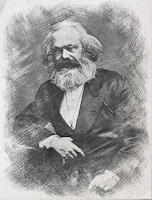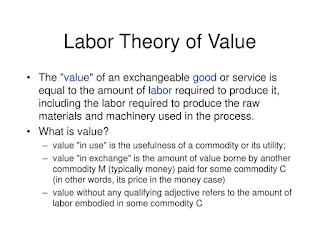As we saw in the previous posting on this subject, Charles Dickens’s character Ebenezer Scrooge turns out not to have been so much a bad man, but an incomplete person. Once he accepted grace and “converted” to personalism, as Dickens put it, “He became as good a friend, as good a master, and as good a man, as the good old city knew, or any other good old city, town, or borough, in the good old world.”
Still, despite a near-miraculous transformation, Scrooge (and Dickens) left something out. That was the need to supplement people’s ability to produce with labor, with ownership of capital. In the early nineteenth century, it was becoming painfully obvious that for some reason, owners of capital were getting an increasingly large share of the goods of this world, while the owners of labor were barely making it, if at all.
Neither was Dickens alone in making this observation. Five years after Scrooge first appeared in “A Christmas Carol,” Karl Marx in The Communist Manifesto (1848) urged the workers of the world to rise up and break their chains — which he ascribed to the institution of private property. As he said, “the theory of the Communists may be summed up in the single sentence: Abolition of private property.”
 |
| Karl Marx |
As Marx explained, however — consistent with the labor theory of value he borrowed from David Ricardo (not Adam Smith) — he didn’t mean all private property, just ownership of anything that is not itself human labor or the direct product of human labor. That’s because, in common with John Maynard Keynes a few generations later and many other socialists, Marx believed that capital produces nothing; everything is due solely and exclusively to labor.
What about land? you foolishly ask. After all, in binary economics, land and technology are both included under capital as they are both non-human factors of production.
This creates a bit of a problem. Some forms of socialism insist that land is the only thing that can be owned, while others that it is the only thing that can’t be owned. Marx included collectivization of land on his list of measures to abolish private property, and the agrarian socialist Henry George built his entire theory on abolishing all private ownership of land.
 |
| David Ricardo |
In trying to apply his reformulation of Adam Smith’s labor theory of value, David Ricardo claimed that land is both a cost-free factor of production and not a factor of production at all. That is, according to Ricardo, land both is, and is not productive! Known as “Ricardo’s Detour,” by means of which he argued out of both sides of his mouth at the same time to try and make his labor theory of value work, this violates the first principle of reason that supposedly underpins the whole of western civilization: that nothing can both “be” and “not be” at the same time under the same conditions.
Marx, by the way, resolved the issue — sort of — twenty years later in Das Kapital. As he explained, only labor gives value, but if it is used to produce something that has no value, the labor doesn’t count as labor.
Uh, huh.
 |
| Marxist Labor Theory of Value |
Anyway, Marx also declared that the communists didn’t want to abolish all private property, just bourgeoisie private property obtained or produced by something other than labor . . . because only labor is productive, so if capital appears to be producing value, it must be surplus value stolen from workers and consumers. So Marx came up with a noble-sounding equivocation that allowed him both to push for the abolition of private property and protest against it! As he said —
We Communists have been reproached with the desire of abolishing the right of personally acquiring property as the fruit of a man's own labour, which property is alleged to be the groundwork of all personal freedom, activity and independence.
Hard-won, self-acquired, self-earned property! Do you mean the property of the petty artisan and of the small peasant, a form of property that preceded the bourgeois form? There is no need to abolish that; the development of industry has to a great extent already destroyed it, and is still destroying it daily.
 |
| Two Factors: Non-Human (Capital), Human (Labor) |
The problem was that by removing the non-human factors of production from the equation, the socialists created a giant blind spot that prevented them from seeing the obvious solution. the answer is not to abolish private property in capital, but to ensure as far as can be done that as many people as possible own capital.
Nor were the capitalists any less blind, albeit in a different area. The best of them, like Scrooge, believed that if people were not being paid enough to live a decent life, it was because a just, market-determined wage was insufficient (true). Consequently, it was only by being more generous and charitable — or for some of the dumber capitalists, if the poor would just stop being so lazy and also limit the number of useless brats they brought into the world so they could live within their means — that the lot of the Cratchits and others could be made bearable (false).
. . . which leaves us back where we started, as we will see in the next posting on this subject.
#30#

